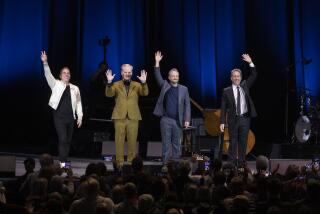Taking a pulse
There are two schools of thought (or laughter) when it comes to the Marx Brothers.
Marx Brothers purists prefer to see the comedy team in the low-budget, wild-and-crazy comedies they made at Paramount such as the seminal 1933 political satire “Duck Soup.” Other fans who were raised on their bigger-budget MGM vehicles such as 1935’s “A Night at the Opera” believe the siblings were never funnier than when they were at the studio.
The American Cinematheque retrospective, “A Night at the Opera: The Marx Brothers on the Big Screen,” which opens Thursday at the Egyptian and runs through Sunday, should appeal to both camps.
The festival includes three films Groucho, Harpo and Chico made at MGM that made them superstars, including “A Night at the Opera,” and three of their early outrageous, rapid-fire comedies made at Paramount, including “Duck Soup” and 1929’s “The Cocoanuts,” based on their Broadway stage hit, which was the first film they made. The Paramount vehicles also feature the youngest Marx, Zeppo, who usually played the romantic lead.
“The real purists maintain that any given Paramount is better than the finest MGM,” said Steve Stoliar, author of “Raised Eyebrows: My Years Inside Groucho’s House.” He will be at the Cinematheque on Friday to sign books and introduce “A Night at the Opera.” Stoliar became Groucho’s assistant in 1974 and worked for him until the comic’s death in August 1977.
(Stoliar will also be appearing March 14 at Hollywood Heritage’s “Evening@at the Barn,” presenting “Remembering Groucho,” featuring rare clips and reminiscences.)
“I like ‘Night at the Opera,’ ” Stoliar said. “It is a tipping point; some consider it the zenith of their artistry, and others consider it past the golden period. There is no right answer because it’s so subjective.”
Robert Bader, author of “Groucho Marx and Other Short Stories and Tall Tales: The Selected Writings of Groucho Marx,” believes there definitely is a right answer.
“The five Paramounts are the best, and it’s downhill after that,” said Bader, who will also be at the Egyptian on Friday and Saturday to sign books and introduce the films. Bill Marx will also be appearing at the Cinematheque to sign his book, “Son of Harpo Speaks,” and introduce films Saturday.
“I loved ‘Night at the Opera’ and ‘Day at the Races,’ ” Bader said. “But the Paramount films were so irreverent and haphazard and the pacing is incredibly quick. You look at ‘Duck Soup’ and it’s 77 minutes long.”
MGM “boy wonder” producer Irving Thalberg brought the Marx Brothers to the studio in 1935. “Thalberg was their champion,” Bader said. But after Thalberg died in 1936, the Marx Brothers were in trouble because studio chief Louis B. Mayer didn’t like them.
“Thalberg took them on as a pet project, and when he died they put a guy named Larry Weingarten on ‘Day at the Races,’ ” Bader said. “The story goes that Groucho was walking across the lot and he ran into Louis B. Mayer, who said, ‘How is the picture going?’ And Groucho said, ‘I don’t think it’s any business of yours.’ That pretty much was the end of the Marx Brothers. He loaned them out to RKO to do ‘Room Service.’ ”
Bader and Stoliar fell in love with the brothers as youngsters. “The Marx Brothers had a seamless blending of genuine literary humor and broad physical comedy,” Stoliar said. “You had broad physical comedy with the Three Stooges and some funny dialogue and slapstick with the Ritz Brothers, but when you have George Kaufman and S.J. Perleman writing material for Groucho, you get this really witty, clever stuff and the physical stuff.”
Said Bader: “I remember seeing ‘Monkey Business’ for the first time and seeing Harpo interrupt the Punch and Judy puppet show for children and just roaring. The more cerebral stuff got to me a bit later. Kids have to keep discovering the Marx Brothers because anybody who has a feeling for rebellion or frustration with the system gets to see Groucho deal with it.”
For information on the Cinematheque showings go to www.americancinematheque.com; for “Evening@the Barn,” go to www.hollywoodheritage.org.
--
susan.king@latimes.com
--
BEGIN TEXT OF INFOBOX
Make ‘em laugh
Here’s a look at three movie comedy teams from the 1930s:
Wheeler and Woolsey
Bert Wheeler and Robert Woolsey re-created their comedic Broadway roles for the 1929 film version of “Rio Rita” and became one of the most successful teams until Woolsey’s death in 1938.
The Ritz Brothers
Al, Jimmy and Harry were a vaudeville comedy-dancing team who starred in such films as “Life Begins in College” and “The Three Musketeers.”
Ted Healy and His Stooges
Moe, Shemp and Larry were part of the vaudeville team with Healy. Curly replaced Shemp and in 1933, they were signed by MGM. The act dissolved in 1934 and the Three Stooges were born at Columbia.
More to Read
The biggest entertainment stories
Get our big stories about Hollywood, film, television, music, arts, culture and more right in your inbox as soon as they publish.
You may occasionally receive promotional content from the Los Angeles Times.











